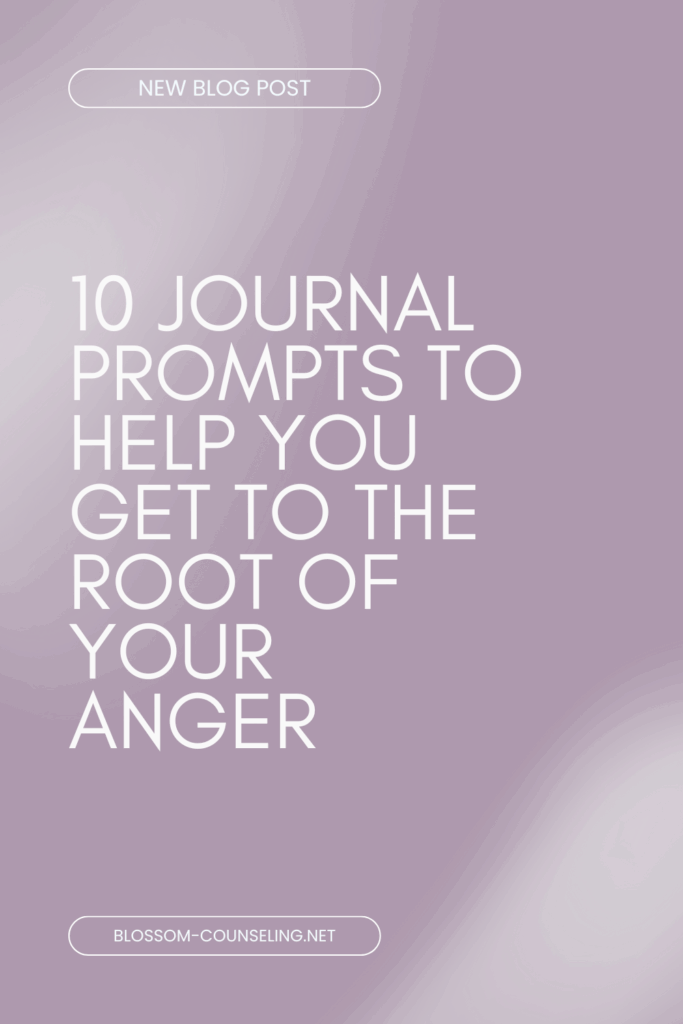
Anger gets a bad reputation. It is often labeled as negative, unhealthy, or something to control as quickly as possible. But anger itself is not the problem. It is a valid emotion, and more often than not, it is trying to tell you something important.
Under anger, there is usually another feeling waiting to be noticed. Hurt. Fear. Disappointment. Shame. A sense of being powerless or overlooked. If you find yourself snapping at people, holding everything in until you eventually explode, or walking around feeling irritated most of the time, it may be worth slowing down and asking what your anger is responding to.
One of the most effective ways to do that is journaling. Writing creates space to think without judgment. It slows your thoughts down just enough to help you notice what is happening beneath the surface. These prompts are not about getting rid of anger or criticizing yourself for feeling it. They are about understanding it.
Take your time with them. You do not need to answer all of them at once.
1. When was the last time I felt really angry
What happened, and what was I feeling underneath the anger
Sometimes the trigger is obvious, like a comment that landed the wrong way or a situation that felt unfair. Other times, the anger is pointing to something deeper, like feeling dismissed, ignored, or unimportant.
2. What does anger feel like in my body
Anger often shows up physically before we even register it emotionally. Maybe your jaw tightens, your shoulders tense, or your chest feels hot. Getting familiar with these cues can help you recognize anger earlier, before it takes over.
3. What boundary of mine was crossed
Or did I only realize that boundary existed once it was crossed
Anger is often a signal that one of your limits has been pushed past. This question can help you clarify what you actually need and where your boundaries are still forming.
4. What story do I tell myself when I get angry
Notice the thoughts that show up automatically. You might hear things like no one respects me, I always have to handle everything myself, or this is never going to change. These beliefs often run in the background and shape how intense the anger feels.
5. Who taught me how to express anger growing up
What did I learn from them
Think about how anger was handled in your family. Was it explosive, avoided, minimized, or punished? The way you respond to anger now often mirrors what you saw or experienced early on.
6. Are there patterns to my anger
Pay attention to whether certain situations, people, or environments show up again and again. Maybe your anger is tied to work, relationships, or feeling out of control. Patterns offer valuable information.
7. How do I usually respond when I feel angry
Do I fight, shut down, avoid, or try to please
Each response comes with a cost. Understanding your default reaction gives you more choice about how you want to respond moving forward.
8. What do I wish I could say when I am angry
If I knew it would be received with kindness and curiosity
This question gives your anger a voice in a safe way. Often, what comes out is not aggression but honesty about needs, limits, or pain.
9. What needs of mine are not being met when I feel angry
Anger often points to unmet needs, like safety, respect, support, or being seen. Naming those needs can shift anger from something overwhelming into something informative.
10. What might my anger be protecting me from feeling
Sometimes anger acts like a shield. Underneath it might be grief, fear, sadness, or loneliness. Those emotions can feel more vulnerable, but they often need attention too.
Exploring anger does not mean excusing harmful behavior or staying stuck in it. It means treating anger as information rather than a problem to eliminate. Journaling is one way to follow that information back to its source with honesty and care.
When you stop fighting your anger and start listening to it, something often changes. It may not disappear, but it tends to soften once it feels understood. And that understanding can open the door to clearer boundaries, healthier expression, and a better relationship with yourself.
Hi, I’m Shalyn. I’m a licensed therapist in Pennsylvania, Delaware, and Vermont. I work with teens, young adults, and adults who are ready to stop feeling so stuck in their heads. Anxiety, OCD, and grief can take over your thoughts, your energy, and your peace of mind, and my role is to help you get back to feeling steady again.
In sessions, I bring structure, empathy, and honest conversation to help you untangle what’s been weighing you down and start finding clarity. I believe therapy should be both supportive and productive. You’ll get real tools, new perspectives, and space to breathe without judgment.
If you’re ready to feel calmer, more confident, and back in control of your life, I’d love to help you get there.




